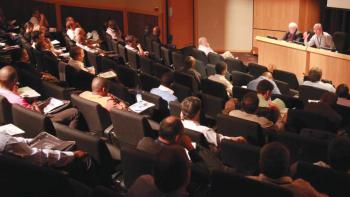African Water Leakage Summit Highlights
This year's African Water Leakage Summit highlighted the growing importance of water loss control in the African environment.
The two events, each held over two days in both Johannesburg and Cape Town, attracted more than 200 delegates in total, from nine countries. This is the first African regional water losses summit to be officially sanctioned by the International Water Association.
This year's event was a joint effort involving the private and public sectors, with WRP as the main organiser and supported by many organisations, including the South African Department of Water Affairs, the South African Water Research Commission, the Development Bank of South Africa (DBSA), The City of Tshwane, Sasol, the German Government (GiZ), British Government (DFID) and the Australian Government (AusAid)
Details of Proceedings
Tim Waldron
The events were opened by Tim Waldron, who is well known as one of the top water demand management (WDM) specialists in the world and chairman of the IWA Water Losses Specialist Group. In his opening address, Waldron emphasised the importance of reducing water losses from potable water supply systems worldwide and the key role that is being played by the IWA in its efforts to drive down wastage. He presented an overview discussion on the latest developments around the world with regard to the reduction of water losses in urban areas. Waldron highlighted that the matter of water losses is now considered by the IWA to be one of the most important issues facing the world today. He indicated that, from his own assessment in South Africa, he believes that pressure management is one of the most important water loss interventions that should be considered as part of any water loss strategy, owing to the relatively high pressures that exist throughout the country.
He commenced his second presentation by congratulating the South Afican Water Research Commision for being one of the first organisations in the world to formally take up and support the IWA Water Balance from a national perspective. He applauded the Water Research Commission's approach of developing a full range of BABE software for free distribution throughout the country in order to encourage water loss reduction in all municipalities. He continued to stress the importance of moving away from percentage losses by using a series of examples from around the world where percentage losses are extremely misleading.
Prof Mike Muller
Professor Mike Muller is the commissioner to the National Planning Commission, which advises the South African government on all water-related matters. He is also the specialist infrastructure advisor to the DBSA, in addition to being a visiting professor at Wits University. Prof Muller's presentation primarily related to why a pragmatic approach to water loss reduction is one of the most critical issues facing South Africa. He touched on the importance of educating everyone working in all aspects of water services, from managers to labourers, since they must understand and appreciate how they fit into the bigger picture of reducing water losses. He then presented examples highlighting the water resource situation in various large municipalities, where the need for both WDM and new water resource developments is already evident. He concluded his presentation by stating that "There will be a water crisis in South Africa in the next decade unless we pay more attention to the way in which we manage our water - leak control and demand management will be vital."
Allestair Wensley, Paul Herbst, Niel van Wyk and Simon Scruton
Following Prof Muller's opening address, there were three related discussions from the three key directorates within the Department of Water Affairs, all of which dealt with different aspects of water loss control from the government's perspective. Firstly, Allestair Wensley, who is responsible for Local Government Planning and Information, provided a strategic interpretation of all water services information on which major government decisions and policies are based. Wensley set the scene for the summit by repeating the recent statement by the president, in which he indicated that South African municipalities must aim to reduce water losses by half by the year 2014.
Paul Herbst from the Directorate of water Use Efficiency explained the actions being taken by his directorate to assist water suppliers in reducing their non-revenue water.
Niel van Wyk from the Directorate of Project Planning highlighted the fact that many parts of South Africa are already experiencing water shortage and that the government is planning for new resource developments to try and keep pace wit hthe ever-growing demands.
Simon Scruton from Ethekwini Metro (Greater Durban area) provided an overview of the massive scale of WDM interventions being undertaken in Ethekwini.
William Moraka
William Moraka, who is the director of water services at SALGA, provided the local government's perspective on water services and began his presentation by outlining the various initiatives that local and national government has embarked on to mitigate the water scarcity facing South Africa, including huge investments in transfer schemes to augment the country's water resources.
Ian Banda
Ian Banda, MD of the Kafubu Water & Sewerage Company in Zambia, provided insight into the water supply situation in Zambia.
Jay Bhagwan
Jay Bhagwan, director of water use and wastewater management at the South African Water Research Commission, presented an overview of WDM and also details of the various models available from the Water Research Commission to assist municipalities in addressing water losses.
Thembi Mkize, Andries Meyer, Bob Kleynjan & Moses Maboya
Thembi Mkize, who has an honours degree in Water Utilisation, from Emfuleni Local Municipality and Andries Meyer, a water utilisation specialist from Sasol New Energy, provided a completely novel approach to the problem of funding. They were supported in Cape Town by Bob Kleynjan and Moses Maboya, from Sasol and Emfuleni Municipality respectively. The project presented is a unique offering in which the public sector and private sector co-operate to save water in the municipality.
Godfrey Mwiinga and Louis Strydom
Godfrey Mwiinga and Lois Strydom, both from the DBSA, presented details of how the DBSA can assist with the funding of WDM interventions in the municipal environment.
Zama Siqalaba
Zama Siqalaba from WRP presented an overview of the community awareness and schools education programmes that she has organised in connection with various WDM initiatives.
Etienne Hugo
Etienne Hugo heads up the Non-Revenue Water Reduction Programme for the largest demand centre in South Africa, the City of Johannesburg, with an annual demand of approximately 500 million cubic meters per annum. He explained the various interventions being implemented throughout Johannesburg, which include large-scale pressure management, as well as one of the largest pre-paid metering initiatives in the world.
Dr Alexander Sinske
Dr Sinske provided an overview of the methodology being employed by the City of Tshwane (the capital of South Africa) to identify pipes in need of replacement.
Louw Smit
Louw Smit from Beaufort West presented a very interesting case study on the recent water crisis that gripped the small town of Beaufort West, which is located in the dry Karoo area of South Africa.
Stuart Hamilton
Hamilton, a leak detection specialist form the UK, provided an overview of the various techniques and equipment that can be used to identify and locate leaks from municipal water supply systems.
Keith Bailey, Prof van Zyl and Danie van Eeden
Bailey from Elster Kent provided details on domestic metering and suggested that municipalities should replace the domestic meters at regular intervals and he provided an interesting case study where meter replacement provided a three-month pay-back. van Eeden from Sensus concentrated on the importance of bulk meters and again highlighted examples where small errors on bulk meters can be translated into very substantial losses of water sales by a bulk water provider. Prof van Zyle presented details of his new book, which is now available through the South African Water Research Commission.

